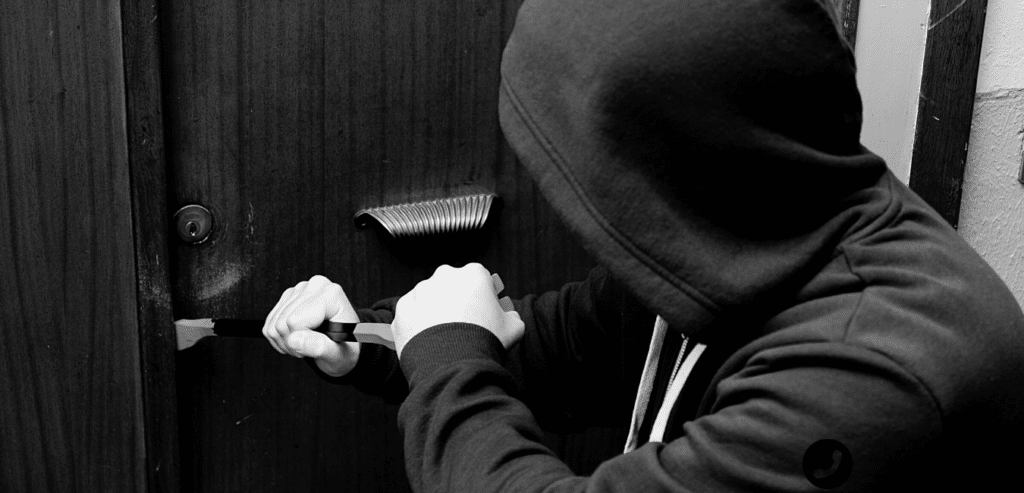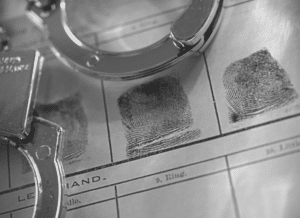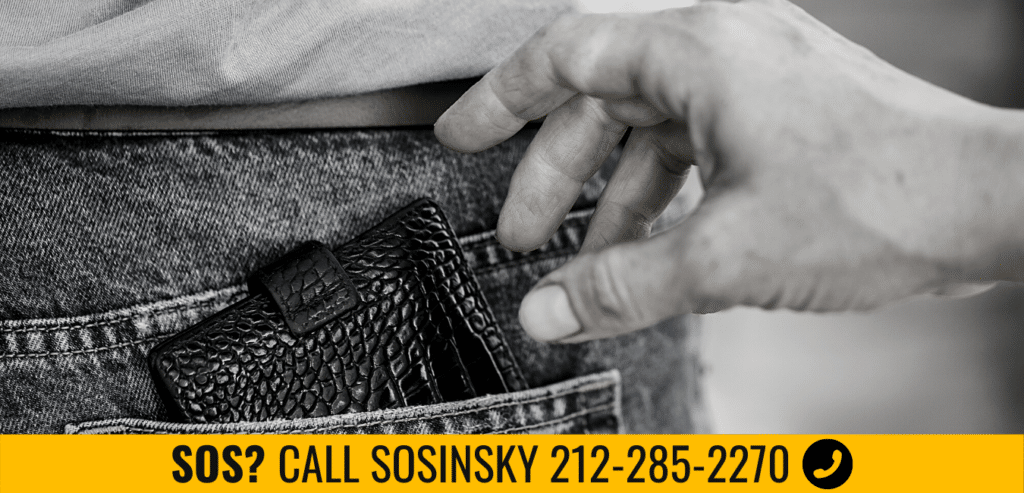NYC Grand Larceny Lawyer
What Are Grand Larceny Charges in New York?
Under New York law, there are a number of different ways in which a person may engage in conduct constituting the crime that results in grand larceny charges in New York. All of the various methods by which one may commit the felony offense of grand larceny involves intentional and deliberate stealing of money or property owned by another. If you or a loved one have been accused of any type of grand larceny crime, you will need an experienced NYC grand larceny lawyer or theft defense lawyer to go to bat for you in New York state court.
One who will investigate whether the prosecution actually has sufficient evidence of criminal intent, that actions cannot be explained by a mistake in procedure or reasonable belief, and that they have properly valued the property at issue. Fred Sosinsky has 30 plus years of criminal defense experience representing clients facing grand larceny charges in New York and a proven record of success in such cases. Call NYC grand larceny lawyer, Fred Sosinsky, now to discuss your defense and options.
Grand Larceny May Be Committed Various Ways in New York
Grand larceny charges in New York come in all shapes and sizes. However, the charges and sentencing are all serious and should be fully understood before choosing your criminal defense attorney. One can steal property and commit Grand Larceny through any of the following actions:
- By removing it from the owner’s property, by tricking the owner into turning it over, or by obtaining the property by false pretenses
- By acquiring property which the accused knows to have been lost or mislaid property or property delivered by mistake as to the recipient or the amount unless he or she takes reasonable steps to return the property to the owner
- By issuing a bad check
- By false promise to engage in conduct so long as at the time of the promise he does not actually intend to engage in such conduct
- By extortion which means compelling the owner of the property to deliver it to you or a third person by means of instilling a fear that if the owner fails to do so, the accused or another person would cause physical injury to a person in the future, would cause property damage, would engage in other criminal conduct, cause criminal charges to be brought against the owner of the property, expose a secret whether it be true or false that would cause the owner ridicule, cause an unlawful labor strike, testify or provide information or refuse to do with respect to another’s a legal claim, use or abuse the accused’s position as a public servant to affect another adversely or perform any other act which would not in itself materially benefit the actor but which is calculated to harm another person materially with respect to his health, safety, business, calling, career, financial condition, reputation or personal relationships.
Thus, what may be referred to as embezzlement, diversion of funds, bouncing checks, defrauding customers or businesses into paying you money, and other forms of criminal fraud are usually seen as grand larceny charges in New York.

Types of Grand Larceny Charges in New York
Depending on the type of property allegedly stolen, the circumstances of the alleged theft, and the value of the property, larceny charges may be either a misdemeanor or a felony. Most grand larceny charges in New York are based on the mere value of the property in question that was allegedly stolen. The value of the property, under Penal Law Section 155.20, is either the fair market value at the time and place of the alleged grand larceny or the cost of replacement of the property, if the value cannot be successfully ascertained. Below are the types of grand larceny charges in New York:
Grand Larceny in the Fourth Degree
Grand Larceny in the Fourth Degree is a Class E felony punishable by up to four years in state prison. A person may be charged with grand larceny in the fourth degree when they steal property from the person of another, or by “extortion” as that term is defined in the law when the value of such property stolen is greater than $1,000 when the property was stolen is a publicly filed record, secret scientific material or is a debit or credit card, when the property was stolen is a religious relic, scroll, or symbol, or used to make methamphetamine, or is a firearm, rifle or shotgun, or a motor vehicle valued in excess of $100.00.
As can be seen, wrongfully taking the property of any value from someone’s body, pockets, or bag they are carrying, such as takes place with a pickpocket-type crime, is a felony offense. Similarly, wrongfully taking anything of value from another through threats of harm to their person or property — via extortionate means — is also a felony matter.
With regard to the value of the property involved in the crime, New York law imposes a “fair market value,” which is measured by the value of the property at the time and location of the crime. If this value cannot be ascertained, the value will be determined by the cost of replacing the item within a reasonable time following the commission of the crime.
Grand Larceny in the Third Degree
Grand Larceny in the Third Degree is a Class D felony offense punishable by up to seven years in state prison A person may be charged with this offense when they steal property and the value of such property exceeds $3,000 or involves an ATM.
Grand Larceny in the Second Degree
Grand Larceny in the Second Degree is a Class C felony offense punishable by up to fifteen (15) years in state prison. A person may be charged with grand larceny in the second degree when they steal property and the value of such property exceeds $50,000 in value or property of any value is stolen through forceful, aggravated extortion (e.g., threats of violence or force).
Grand Larceny in the First Degree
Grand Larceny in the First Degree is a Class B felony punishable by up to 25 years in state prison. A person may be charged with this offense if they steal property and the value of such property exceeds $1,000,000.
Defenses to Grand Larceny Charges in New York
One defense to a grand larceny indictment centers around a lack of proof that the accused intended to deceive or defraud the supposed victims of the crime. Often enough, it may be shown that what is charged as a crime is actually a business or contractual dispute where one party runs to law enforcement in an effort to short-circuit prolonged litigation. NYC grand larceny lawyer, Fred Sosinsky, has been able to convince prosecutors of this improper use of their resources on many occasions over his years in practice.
Another defense available in those cases in which the theft is based upon supposed over-or improper billing of either public or private insurers or entities is that the acts were the result of mistakes or omissions rather than deliberate fraud. Fred has won his share of cases where such a showing has been made even where the charged conduct was in the hundreds of thousands of dollars.
Third, are those cases where there is a heated dispute concerning the valuation of the property claimed to have been stolen. By working with experts in the valuation of property, a Manhattan grand larceny lawyer can get grand larceny charges in New York reduced significantly, even to misdemeanor levels.
Contact the Top NYC Grand Larceny Lawyer Today
NYC Grand Larceny Attorney Fred Sosinsky has won jury verdicts and gained dismissal of charges for his clients wrongfully accused of having stolen monies or property from others. Through tireless investigation of the evidence, Fred will guide you through troubled times and work to add your case to his long list of success stories
SOS? CONTACT SOSINSKY
NYC Criminal Defense

Unprecedented Healthcare Fraud Schemes Exposed
Unprecedented Healthcare Fraud Schemes Exposed: A Glimpse into the Recent DOJ Crackdown In a groundbreaking move, the Department of Justice has unveiled criminal charges against

Conspiracy Charges in NY
NYC Conspiracy Crime Lawyer Conspiracy charges in NY are valid when two or more parties make a clear agreement to engage in criminal activity. Under

Federal Crimes Vs. State Crimes
Acts which are illegal under the laws of the United States federal government are known as federal crimes or federal offenses. Federal crimes are different

